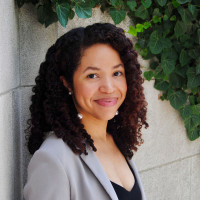
This talk undertakes a partial genealogy of breath as it has been racialized within the project of modernity. I argue that Eric Garner’s “I can’t breathe” sits amongst the larger and longer singularity of Black breath being circumscribed and suffocated, while concomitantly highlighting the struggle to resist and exist within this project. I offer up the term Black breath as a lexicon through which we can thread together new histories, theories, and philosophies of the biopolitical project of modernity in order to expand the critical grammars of the contemporary moment. Hold:Space is a criticopoetic digital project that tenders constellations between Blackness and, as, and with breathing.
Vulnerability to loss of breath has been a formative figure in the Black performative, literary, and lived tradition, one that provides if not a praxis of liberation, then a kind of radical sociality, a kind of quantum entanglement. Sojourning with that cramped suffocating cavity of the hold and the endless possibilities that breathing space conjures, I explore these two spaces as co-constitutive: Hold contends with the resonant tides of the Middle Passage and the lost breath below the kala pani; Space is a moment to tumble into possible futurities—fall into what space to breathe fully might look like.
Kimberly Bain is a Ph.D. Candidate in English and Interdisciplinary Humanistic Study at Princeton University. Kimberly’s most pressing intellectual interests include the history, theory, and philosophy of: diaspora, race, gender, postcolonialism, enslavement, flesh, environmental racism, resistance, embodiment, and subjection and subjecthood. Her dissertation, entitled “On Black Breath: A Theory and Praxis”, takes seriously the charge of “I can’t breathe” and considers breath as more than the mere metaphor—rather, as also a somatic and sociopolitical phenomenon that has resonances in the wake of enslavement to the contemporary moment.
Kimberly is affiliated with the American Studies Program, Department of African-American Studies, and the Center for Digital Humanities. More information about her current work can be found at kimbain.com.
A continuously updated schedule of talks is also available on the Digital Dialogues webpage.
Unable to attend the events in person? Archived podcasts can be found on the MITH website, and you can follow our Digital Dialogues Twitter account @digdialog as well as the Twitter hashtag #mithdd to keep up with live tweets from our sessions. Viewers can watch the live stream as well.
All talks free and open to the public. Attendees are welcome to bring their own lunches.
Contact: MITH (mith.umd.edu, mith@umd.edu, 301.405.8927).
